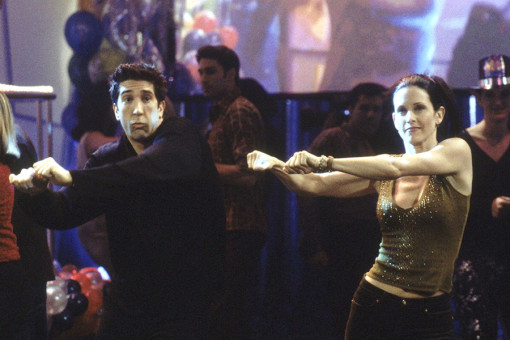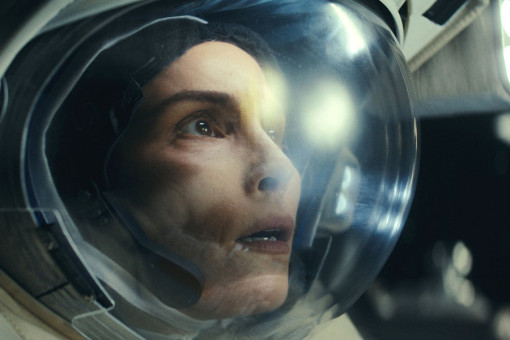Terry Pratchett was dying of Alzheimer's.
Having authored dozens of beloved fantasy novels, he'd collaborated with Neil Gaiman on the 1990 novel Good Omens, a comedic look at the End Times. Gaiman was then known as a comic book writer, primarily as the creator of Sandman. Good Omens was his first novel, but there would be many more as he moved away from comics and into more mainstream literature.
For years, the pair had tried to get an adaptation of Good Omens off the ground, but a series of screenwriters had politely declined the project. So it languished, gathering dust and frustrating its authors and fans.
But as Pratchett saw his own end time looming, he turned to his writing partner and longtime friend to request a favor. "Terry knew the darkness was coming," Gaiman says. "So he asked me if I would make it and I said yes. Then Terry died. It was a sort of last request."
After he returned from the funeral in March 2015, Gaiman started doing something new: directly adapting his own material. Previously, he'd handed it off to others, feeling that he'd told the story his way, and if someone else wanted to interpret it, they were welcome to it. This was different. "It became," he recalls, "a much deeper mission."
He'd done some TV work, writing episodes of Neverwhere and Doctor Who, as well as the animated Marvel series Eternals. Soon, he'd written a six-episode miniseries. BBC Studios and Amazon teamed up to make it, but Gaiman had two very specific requests: he wanted to be the showrunner, and he wanted to work with a single director.
"Amazon came around to the idea that if there was a single director, we could shoot anything at any time, and that would save money," he says. "It made enormous sense, because of how it [would be] shot, and I didn't want to have to train new people. I wanted just one person who got it."
Enter Douglas Mackinnon, who'd been directing British television for a quarter century. Gaiman was familiar with his work, especially the 2007 miniseries Jekyll and an Emmy-winning episode of Sherlock, "The Abominable Bride," both of which had been written and overseen by Steven Moffat, with whom Gaiman had worked on Doctor Who. Suddenly, it was all making sense.
"What sold him to me was his directing of Jekyll," Gaiman says. "It was a sort of glorious sweet-and-sour dish: the humor was funny, the horror was scary, and that was the kind of director I wanted."
Mackinnon was already a fan of Good Omens, so it was a great fit. Indeed, even before he'd met Gaiman, he too believed one person should direct the entire series, which moves from the Garden of Eden to Elizabethan England to the present day.
"With this book, it's impossible to do it without having one vision," Mackinnon observes. "The book has a very internal voice, and the trick was to externalize it. You're also jumping back and forth in time so much, it would have been impractical to have three directors doing, say, two episodes each. We talked from the beginning that we wanted to treat it as a six-hour movie."
That's exactly what they did.
The story is a farcical series of misadventures about the bungling of Armageddon, in which an angel (Michael Sheen) and a demon (David Tennant) decide to sabotage the Rapture because they've become too comfortable with the status quo.
Meanwhile, a mismatched Four Horsemen of the Apocalypse bicker their way toward Doomsday and, thanks to a mix-up at the hospital, the Antichrist ends up with the wrong family.
The series, which premieres May 31 on Amazon, has the same pitch-black humor as the book, with a cast that includes Derek Jacobi, Nick Offerman, David Morrissey, Michael McKean, Miranda Richardson and Mireille Enos. Jon Hamm plays the Archangel Gabriel, Benedict Cumberbatch is Satan and Frances McDormand is God.
"It's a comedy where everyone is going to die," Mackinnon explains. "I think that'll work for people, don't you?"
The undertaking was larger than even Gaiman expected, with 243 speaking parts, more than 600 crewmembers, hundreds of locations, a shooting schedule of nearly 120 days and more than 1,500 VFX shots.
Gaiman says it was "enormously fun" working with Mackinnon as "a solid team." The director consistently prevented the writer from cutting key moments for budget reasons, instead finding solutions that stayed within budget while remaining true to the source material.
"You know that bit in Butch Cassidy and the Sundance Kid where they jump off the cliff and [Sundance] can't swim? It's the same thing," Mackinnon says.
He compares his partnership with Gaiman to that of their show's leads: "It's these two people in the middle of something — an angel and a demon. You don't know where they're going, but you know it's going to be interesting."
Gaiman is thrilled. He says the show "came out even better than I could have dreamed" and is confident Pratchett would approve. Still, taking on such an enormous project and seeing it from development to fruition over four years is something he won't be revisiting.
"It's been an incredibly glorious trial by fire. Neither of us had any idea what we were doing on this scale," he says. "It's part of why I went into it so enthusiastically, because I think I thought it was impossible. We managed to do the impossible, but only because nobody told us." He adds with a laugh, "But I will never do this again."
And when Neil Gaiman makes a promise, he keeps it.
This article originally appeared in emmy magazine, Issue No. 5, 2019














